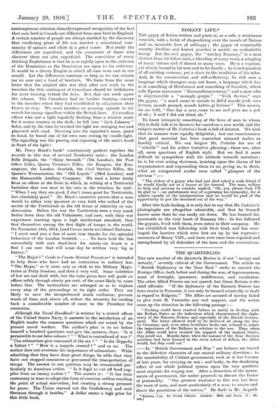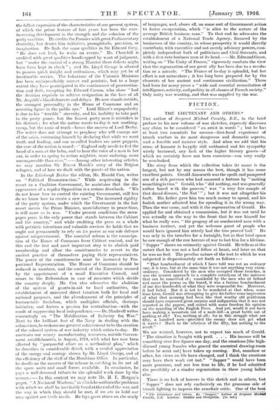THE QUARTERLIES.
THE new number of the Quarterly Review is, if not " savage and tartarly," severely critical of the Government. The article on
" British Diplomacy in the Near East " seeks to convict the Foreign Office, both before and during the war, of ingenuousness, want of foresight, ignorance, indifference, and vacillation. The other Allied Powers are not spared, but Great Britain is the chief offender. " If the diplomacy of the Entente Powers has been remiss in Rumania, it can only be termed criminally at fault in regard to Bulgaria." The Allies are accused of having failed to give even M. Venezelos any real support-, and the writer sums up the situation in the following passage :- "Nothing could have courted failure so surely in dealing with
the Balkan States as the indecision which characterised the diplo- macy of the Entente Powers and especially of the British Govern- ment. The latter allowed itself to be deceived all along the lino by Germany, and, even when hostilities broke out, refused to admit the importance of the Balkans in relation to the war. Thus, when the Allies could have secured the support o£ the neutral States, they would not. Months later, when the axioms of the Near Eastern question had been learned in the stern school of defeat, the Allies would, but they could not."
—In " British Government and War " our failures are traced to the defective character of our central military direction ; to the unsuitability of Cabinet government, such as it has became me of late years, for carrying on war ; and lastly, to the deadening effect of our whole political system upon the very qualities most requisite for waging war. After a dissection of the instru- ments of government, the writer proceeds to discuss the factor of personality. " Our greatest weakness in this war has been the want of men, and more particularly of a man, to arouse and direct the patriotism of the nation?' He finds in Mr. Asquith
• Romany Life. By Frank Cutr.rias. London IBM and Boon. 17 . Gd. net.] -
the fullest expression of the characteristics of our present system, of which the prime feature of late years has been the ever- increasing development in the strength and the cohesion of the party machine. He credits the Premier with great Parliamentary dexterity, but denies him initiative, promptitude, prevision, or imagination He finds the same qualities in Sir Edward Grey. " He does not lead, he waits on events." Mr. Churchill is credited with great qualities handicapped by want of judgment, but " under the control of a strong Minister these defects might have been kept in cheek " ; and Mr. Lloyd 'George is allowed to possess quick insight and enthusiasm, which may yet .be of inestimable service. The behaviour of the Unionist Ministers has been unimpeachably correct and patriotic, but to a large extent they have participated in the continuance of procrastina- tion and drift, excepting Sir Edward Carson, who alone " had the decision requisite to achieve resignation in the face of all Mr. Asquith's blandishments and delays. He now stands outside, the strongest personality in tho House of Commons and an arresting figure in the public eye." Lord Milner's unpopularity is due to his " terrible " sincerity, and his inability to take part in the party game ; but the honest party man is mistaken in his distrust ; for what the nation wants to-day is not soothing- syrup, but the tonic of truth—hence the success of Lord Derby. The writer does not attempt to prophesy who will emerge out of the crisis, contenting himself by declaring that while we want truth and leading, and our so-called leaders are mere puppets, the core of the nation is sound—" England only needs to feel the hand of a man at the helm, and to hear the voice of a man in her ear, in order to spring to action mightier, more enduring, more unconquerable than ever."—Among other interesting articles, we may mention Sir Ernest Hatch's story of the Belgian refugees, and of how we dealt with the guests of the nation.
In the Edinburgh Review the editor, Mr. Harold Cox, writes on " Political Reconstruction." While acquiescing in the resort. to a Coalition Government, he maintains that the dis- appearance of a regular Opposition is a serious drawback. " We do not know bow to control the existing Government, still less do we know how to create a new one." The increased rigidity of the party system, under which the Government in the last resort means the Prime Minister, unsatisfactory in peace-time, is still more so in war. " Under present conditions the news- paper press is the only power that stands between the Cabinet and the country," and while crediting the press as a whole with patriotic intentions and valuable services. he holds that we ought not permanently to rely on its power as our sole defence against misgovernment. The essential reform is the emancipa- tion of the House of Commons from Cabinet control, and to this end the first and most important step is to abolish paid membership and allow the constituencies to revert to the ancient practice of themselves paying their representatives. The power of the constituencies must be increased by Pro- portional Representation. The House of Commons should be reduced in numbers, and the control of the Executive secured by the appointment of a small Executive Council, and resort to the Referendum in case of measures which divide the country deeply. Mr. Cox also advocates the abolition of the system of grants-in-aid to local authorities, the establishment of universal direct taxation both for local and national purposes, and the abandonment of the principles of bureaucratic Socialism, which multiplies officials, destroys initiative, and fosters a passion for centralization—with the result of suppressing local independence.—Dr. Shadwell writes reassuringly on " The Mobilization of Industry fog War." Next to the brilliant feat of the Navy in dealing with the submarines, he reckons our greatest achievement to be the creation of the colossal system of war industry which exists to-day. He contrasts our scanty manufacturing resources, outside Govern- ment establishments, in August., 1914, with what has now been effected by "purposeful effort on a methodical plan," which he describes in considerable detail, with a cordial appreciation of the energy and courage shown by Mr. Lloyd George, and of the efficiency of the staff of the Munitions Office. In particular, he dwells on the success of the scheme in catching in its net all the spare units and small forces available. In conclusion, he pays a well-deserved tribute to the splendid work done by the women.—In this context we may note Mr. H. E. Morgan's paper, "A Nation of Workers," in which he outlines the probleins with which we shall be inevitably faced at the end of the war, and the way in which they should be met, if we are to hold our own against our trade rivals. He lays great stress on the study
of languages, and, above all, on some sort of Government aetion to foster co-operation, which " is alien to the nature of the average British business man." To that end he advocates the establishment of a National Trade Agency, financed by the businesses of the country, to whose prosperity it would directly contribute, with executive and not merely advisory powers, com- pletely independent both of politicians and Civil Servants, and with a first-rate business man at its head.—Mr. Edmund Gosse, writing on " The Unity of France," vigorously combats the view that the regeneration of our great ally has been due to a revolu- tion or a miracle. " The France of to-day is splendid, but her effort is not miraculous ; it has long been prepared for by the elements of her ancient and continuous civilization." There had been for many years a " wide and essential resuscitation of intelligence, activity, and probity in all classes of French society." Only unity was wanting, and that was supplied by the war.



















































 Previous page
Previous page